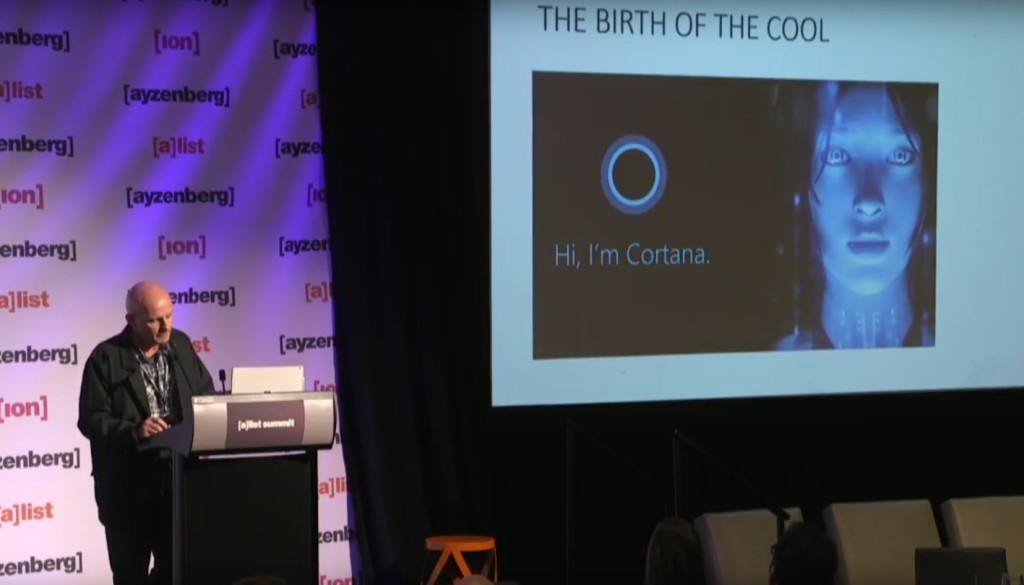In a world where users can ask their phone to do just about anything, the idea of artificial intelligence (AI) is bursting from the pages of science fiction and into the lives of consumers. Frank O’Connor, creative director of the Halo video game franchise joined us at the [a]list summit to discuss this transition, as well as practical applications for the future.
When Halo: Combat Evolved launched in 2001, the world was introduced to a super soldier named Master Chief and his AI companion, Cortana. Now perhaps the most widely-recognized example of AI in pop culture, it was no surprise Microsoft named its new interactive digital assistant “Cortana,” after the intelligent and helpful blue lady. When it came to how Microsoft’s version of Siri would operate, they turned to the very same studio that introduced its namesake to the world.
“[Microsoft] came and talked to us about AIs, the fictional wrapping of AI personality because personality was the thing that they wanted to make distinctive about Cortana,” O’Connor relates. “They wanted her to be super helpful and logical and rational, but they also wanted her to be relatable, and we kind of had a prototype of that. So I got to work with them on how Cortana behaves; how she tells jokes, how she sings songs, how she engages with you.”
Beyond telling a user what time it is or where to find the nearest coffee shop, O’Connor believes that artificial intelligence could even the playing field when it comes to education. In the Halo universe, child soldiers are taught military tactics by an AI named Dejá. Although it was science fiction when the story was written, this kind of technology may soon be available to everyone.
“An AI could literally be the best college professor that Harvard could ever produce. It could absorb that college professor’s persona, it could absorb his teaching style, but importantly, it’s a one-on-one experience.” O’Connor goes on to explain how artificial intelligence could make education available to anyone. “A teacher could teach a Harvard-level education in French to a kid in a village in Ghana if he has a phone. That’s, I think, going to be the future of education, and it’s also going to help us solve the cost of education, having an individual, one-on-one teaching experience anywhere in the world in any language is going to reduce the cost and the risk of education.”
Vehicle manufacturers are introducing safety features such as muting the stereo until a seat belt is fastened. These measures are meant to keep teenagers safe, but O’Connor poses the question of how a computer might accomplish this in the future. “Imagine if an AI was with your kid all the time,” O’Connor challenged. “And instead of just being a spy for a parent, it’s actually a real, moral compass explaining why things are bad.”
Although O’Connor admits that vehicles that far into the future might be driving themselves, the idea of something to keep you on the straight and narrow, so to speak, is still a very real possibility. “Moral guidance is something that a thinking AI could do as a peer in a way that isn’t bullying or parental.”
Marketing With Artificial Intelligence
AI will pose challenges to marketers, O’Connor warns, because they will be programmed to filter unwanted content. The solution, he says, is to build their own intelligence to overcome the resistance. “I would never, never, ever have used Uber had it not been explained to me by a person. People are the best negotiators and they’re the best at convincing people of things.”
O’Connor predicts the sale of synthetic personalities or even personalities of celebrities to gain popularity, but that our dentist AI or the one caring for elderly patients will require their own bodies. How these bodies look will depend on the function for which they are designed, calling to mind the friendly, marshmallow-like appearance of Baymax in Disney’s Big Hero 6.
Having recently lost both his parents, O’Connor added that AI will someday be able to capture the personality and appearance of loved ones. Although a moral debate on electronically cloning an individual is inevitable, learning about physics from a synthesized Albert Einstein would be quite the experience.
“As Arthur C. Clark said,” O’Connor quoted, “‘Any technology significantly advanced is indistinguishable from magic.’ I believe this will be magical.”

